A strong fishy vaginal odor is often a sign of an issue like bacterial vaginosis (BV), a common and recurring condition in young women. Many home remedies can help, but it’s important to choose safe options to support healing effectively and avoid potential irritation.
In this article, we will evaluate which popular home remedies for fishy odor are safe and which are not recommended.
Your Cheat Sheet
- Fishy odor is often caused by bacterial vaginosis (BV).
- Follow your provider’s treatment plan for the best results.
- Avoid risky home remedies like douching with baking soda or vinegar.
- Do not insert garlic gloves into your vagina, opt for garlic capsules instead.
- Boric acid suppositories are effective and work best with medical guidance.
- Eat probiotic-rich foods to boost your immunity and support it with oral probiotics.
Where Does the Fishy Smell Come From?

At different times, a woman’s vagina can have different smells. If the smell becomes strong and noticeable — such as being able to smell yourself through your pants — it might be a sign that something is off.
The most common culprit of a fishy smell is bacterial vaginosis (BV), a condition where the natural balance of bacteria in your vagina is disrupted.
The vagina has its own ecosystem of bacteria, called microflora, which maintains a healthy balance. When this balance is disrupted—often by stress, pH changes, or infections—”bad” bacteria multiply, producing a noticeable odor. Fishy and foul smell is a common symptom of BV.
The fishy odor in bacterial vaginosis is caused by an overgrowth of certain bacteria, especially Gardnerella vaginalis.
Bacterial vaginosis symptoms include a strong fishy odor, thin grayish-white discharge, and mild irritation, itching or burning.
Home Remedies for Fishy Odor: What Works and What Doesn’t
Not all home remedies are safe or effective for treating vaginal odor.
Here is our verdict of what’s recommended and what’s risky:
1. Probiotics
Oral probiotic supplements ✅
Eating probiotic-rich foods ✅

Safety: Completely safe.
Effectiveness: Probiotics have proven to be moderately effective when consumed regularly. There is some evidence that probiotics are effective in treating BV symptoms.
How to use: Eat probiotic-rich foods such as plain unsweetened yogurt or kefir daily or consider oral probiotic supplements. The effects of probiotics are generally seen when taken for a month or two.
Why it works: Probiotics support healthy bacteria in your gut and vagina. In the vagina, probiotics can help maintain a healthy pH balance and prevent the growth of harmful microorganisms, such as those that cause bacterial vaginosis (BV) or yeast infections.
Can I insert a tampon soaked in kefir into my vagina?
This home remedy method has not proven to be effective in fighting BV or bad vaginal smell. We do not recommend doing this if you seek permanent results.
2. Boric Acid
Boric acid suppositories ✅
Boric acid douches ❌
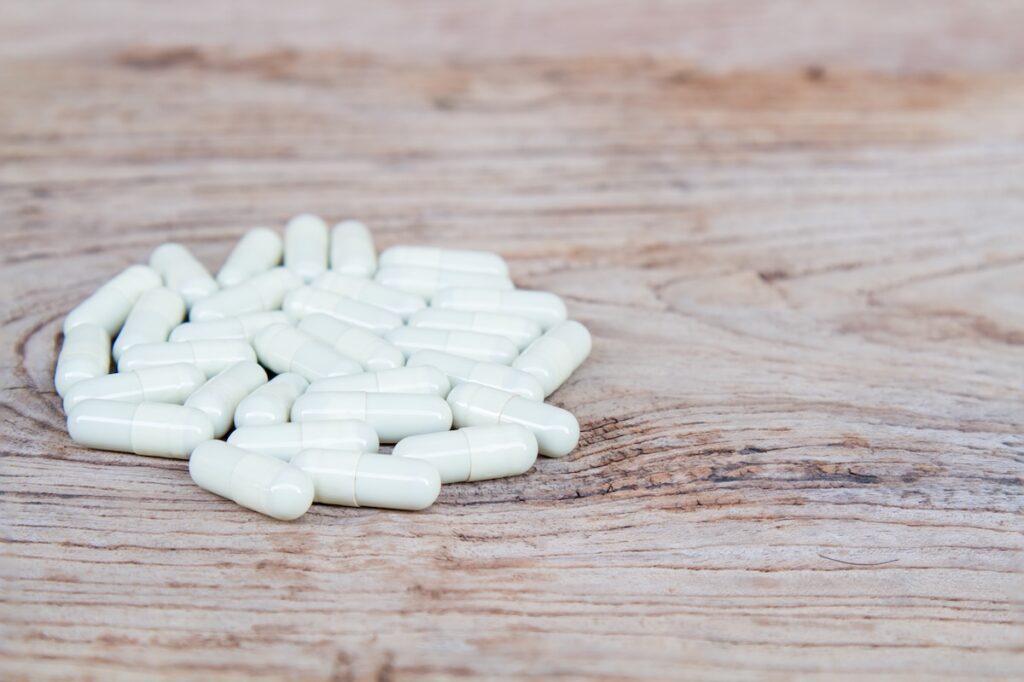
Women with BV have higher-than-normal vaginal pH levels. Some gynecologists prescribe boric acid suppositories for bacterial vaginosis or yeast infection as they help lower vaginal pH.
Safety: Boric acid vaginal suppositories are safe for short-term supervised use. Douching with boric acid is not recommended.
Effectiveness: Boric acid vaginal suppositories have been proven to be effective against BV. While more research is needed, some studies have already shown boric acid’s positive results on treating BV symptoms.
Why it works? Boric acid has antifungal and antimicrobial properties. Boric acid suppositories can help lower vaginal pH and restore the balance of bacteria in the vagina.
How it works? Boric acid suppositories or capsules are entered into vagina overnight as often as prescribed by your ob/gyn. Most boric acid treatments last for about seven to 14 days.
Precaution: It can irritate the vaginal tissue if used incorrectly or for too long. Therefore it’s recommended to consult a healthcare provider before use.
Can I douche with boric acid?
Definitely not. Boric acid is a strong natural chemical that can cause burning, and douching disrupts the sensitive balance of the vaginal flora.
Can I take boric acid orally?
No, boric acid should not be taken orally. It is toxic if ingested and can cause serious harm.
3. Baking Soda
Douching with baking soda ❌
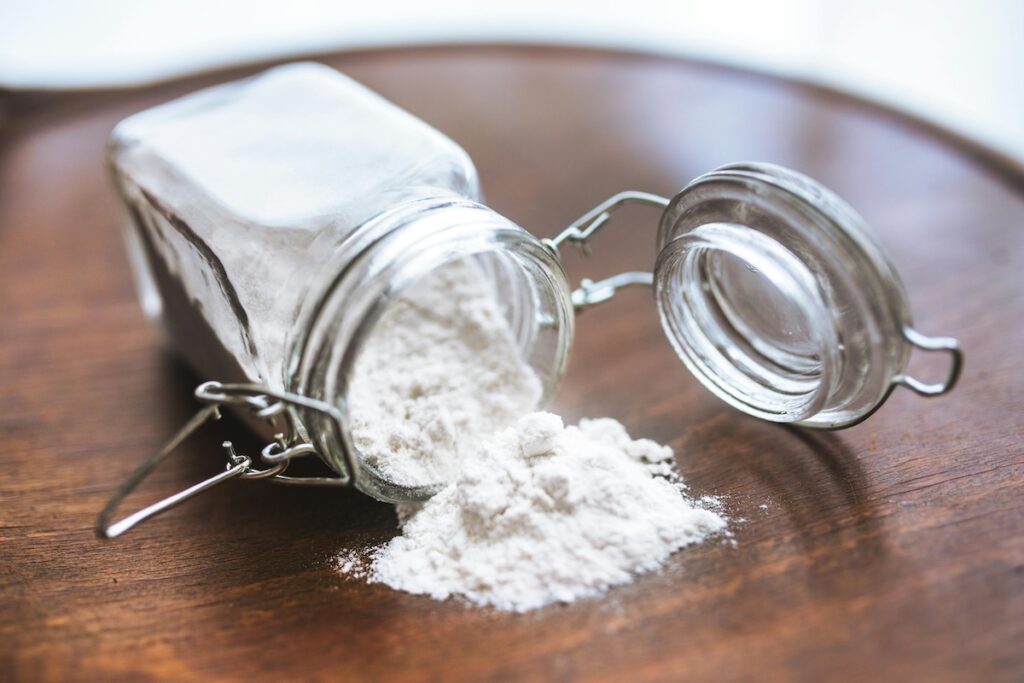
Some sources recommend baking soda for fighting BV and unpleasant vaginal smell, but more and more medical doctors are advising against it. It disrupts the natural pH balance of the vagina, potentially worsening the infection and causing irritation.
Safety: Douching with baking soda is not safe.
Effectiveness: Baking soda douches are not effective for treating BV, and there is no substantial medical research supporting their use.
Why should I avoid it? Baking soda is a white powder used in cooking and in household tasks (against bad odors, cleaning certain surfaces, etc.). It’s not intended for vaginal use. Baking soda disrupts natural vaginal pH and may cause burning, worsening therefore symptoms.
4. Tea Tree Oil
Douching with tea tree oil ❌
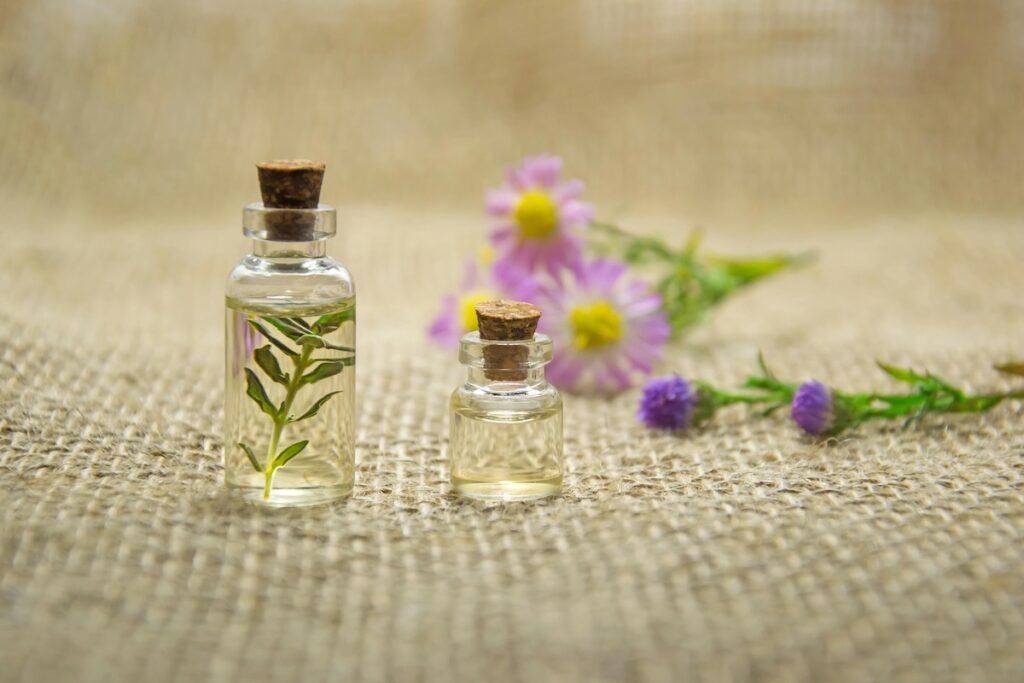
Safety: Douching with tea tree oil is not recommended.
Effectiveness: While tea tree oil has some antifungal and antibacterial properties, studies on its effectiveness for BV are inconclusive. The potential benefits don’t outweigh the risks.
Why not? Tea tree oil can be too harsh for the sensitive vaginal area, causing irritation, burning, and allergic reactions. It may disrupt the natural vaginal flora, potentially making the infection worse or leading to further imbalances.
5. Garlic
Oral garlic supplements ✅
Vaginal garlic gloves ❌
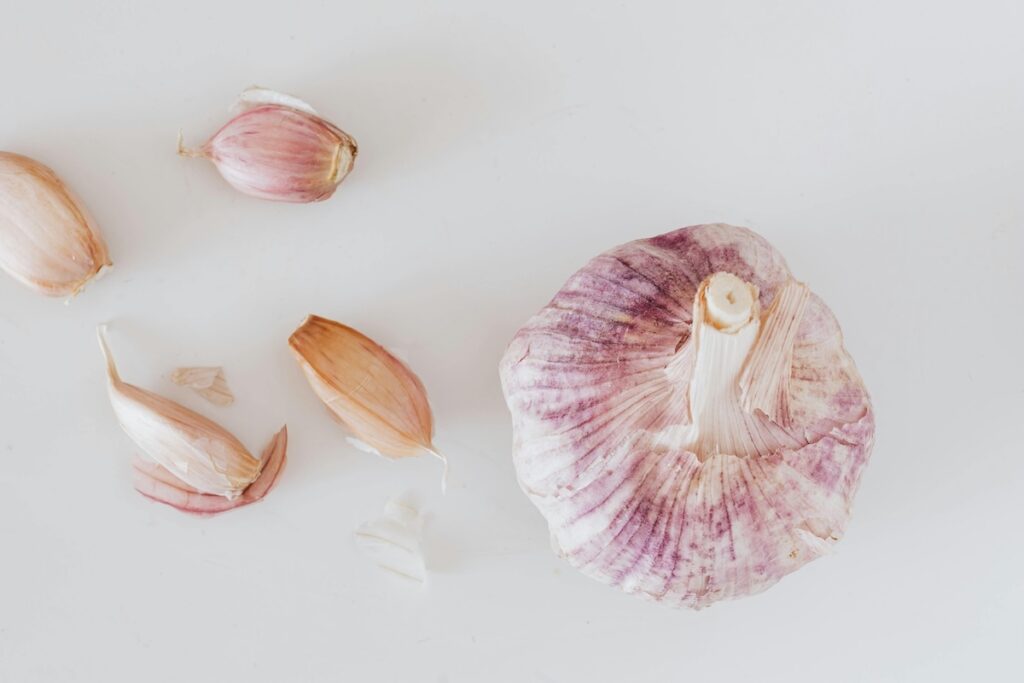
Safety: Oral garlic supplements are safe to use. It’s not recommended to use garlic gloves vaginally.
Effectiveness: Several compounds in garlic have natural antibacterial properties, and garlic supplements have been shown to help alleviate the symptoms of BV.
Why not? Despite myths, inserting garlic can cause burns, irritation, and even infections. Garlic gloves have no proven benefits to vaginal health. And who would want to have a garlic-smelling vagina in the first place?
Why supplements? Garlic supplement tablets have proven to have therapeutic effects. A 2014 study shows that garlic tablets might be just as good as medicine (Metronidazole) to treat BV.
6. Apple Cider Vinegar
Douching with apple cider vinegar ❌
Consuming apple cider vinegar orally ✅

Safety: Safe for oral use, not recommended for internal use.
Effectiveness: There is no medical proof that AVC is beneficial for vaginal use.
Why is it risky? Adding apple cider vinegar to a bath is risky. ACV’s strong acidity can disrupt the vaginal pH, causing irritation and worsening infections like BV.
Can I drink it? It’s safe to consume it orally, adding it to your water. When diluted with water, apple cider vinegar is thought to help support the gut microbiome and thus support the immunity due to its probiotics and acetic acid content.
7. Coconut Oil
Vaginal use of coconut oil ❌
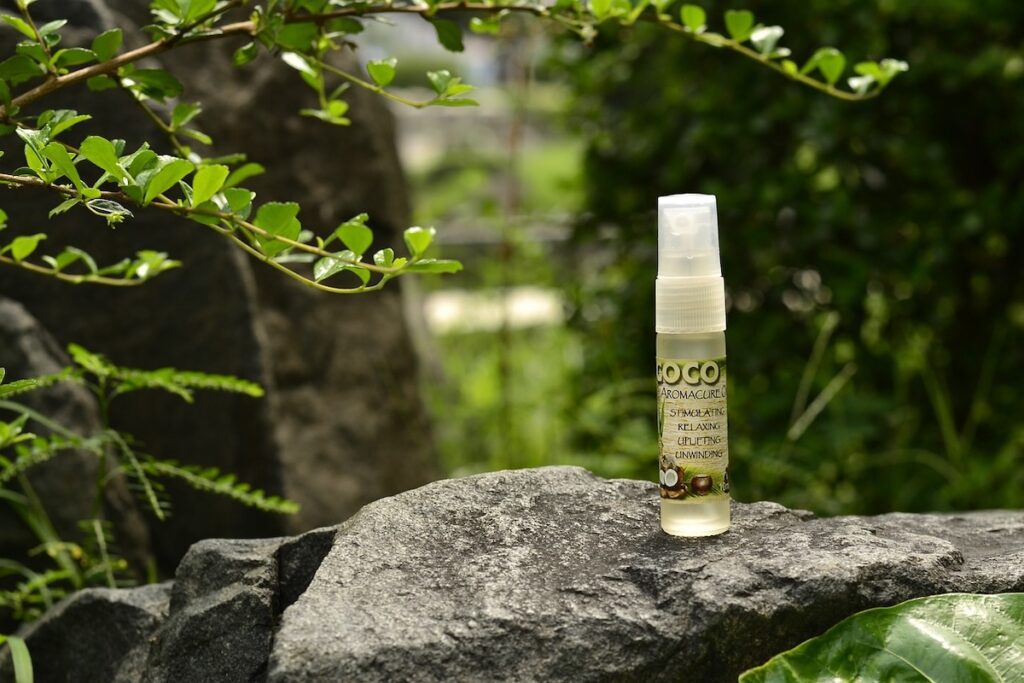
Safety: Moderately safe, but not recommended.
Effectiveness: According to current research, coconut oil is not an effective treatment for BV.
Why not? In fact, coconut oil may trap bacteria if used internally and trigger BV symptoms. You need to be cautious with coconut oils that have hidden chemical ingredients in it that are harmful for your vagina.
Remember, vagina is a self-cleaning environment. Therefore, the best home remedies for fishy odor are a balanced, probiotic-rich diet, good hygiene, and using plain water to wash your vagina.
Best Steps to Get Rid of the Smell
Since the fishy smell comes from inside of the vagina, you cannot get rid of the smell by using scented pads or underwear (and it is strongly recommended against!).
If you suspect BV, it’s important to follow these steps:
1. Consult an OB/GYN
First and foremost, it’s crucial to see a doctor for a proper diagnosis.
A gynecologist will test you for bacterial infections, including BV, and recommend the best treatment, whether it’s antibiotics, boric acid suppositories or other therapies.
2. Take a Vaginal pH Test
A pH test can help determine if there is an imbalance in your vaginal flora, which is often the case with BV.
A vaginal pH test is easy to use, and you can take a pH test at home at your convenience.
3. Be Careful With Sex
If you think you have BV, it’s best to avoid sex or use condoms until it clears up.
If you have sex, it’s important to prevent the spread of bacteria and reduce the risk of BV. Practice safe sex, use condoms, avoid oral sex on the vagina, clean thoroughly between anal and vaginal sex, and urinate after intercourse.
4. Practice Good Intimate Hygiene
Keep the area clean with warm water only (avoid soaps, sprays, or douching).
Wear breathable cotton underwear and change out of wet clothing promptly to maintain a healthy vaginal environment.
5. Take Care of Your Mental and Physical Health
Stress can contribute to BV, so managing stress and improving your overall health through a balanced diet, exercise, and sleep can help prevent future occurrences.
6. Support With Proven Home Remedies
Some home remedies for fishy odor can help alleviate the symptoms and support vaginal health.
For example, you can include oral probiotics or garlic supplements to your morning routine to see if your body feels any improvement. Boric acid vaginal suppositories have also been proven to help alleviate BV symptoms, but it’s best to consult with a ob/gyn for dosage.
When to Seek Medical Help
See your doctor if:
- Symptoms persist for more than a week.
- You notice pain, swelling, or unusual discharge.
- Over-the-counter remedies don’t work.
- You are pregnant.
Conclusion
A fishy vaginal odor is often caused by bacterial vaginosis (BV), a recurring imbalance in vaginal bacteria. Symptoms can take time to resolve, which can be frustrating.
Boric acid suppositories, used under medical guidance, can effectively treat BV. Probiotic-rich foods, oral probiotics, and garlic supplements can also support the body’s defenses. Avoid unproven remedies like douching, baking soda, or garlic cloves, as they can worsen the infection.
While mild cases may resolve on their own, persistent symptoms need a healthcare provider’s diagnosis. A combination of treatment and home remedies has proven effective for many women.
TL;DR
- Fishy odor is often caused by bacterial vaginosis (BV).
- Follow your provider’s treatment plan for the best results.
- Avoid risky home remedies like douching with baking soda or vinegar.
- Do not insert garlic gloves into your vagina, opt for garlic capsules instead.
- Boric acid suppositories are effective and work best with medical guidance.
- Eat probiotic-rich foods to boost your immunity and support it with oral probiotics.



